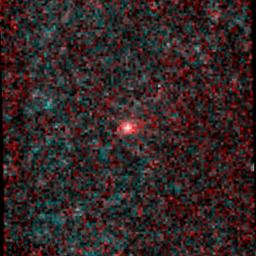
|
An Infrared portrait of Comet NEOWISE (C/2014 C3)
- Click the image above for a larger view
- Full-Res JPEG (1148 x 1148) (152.4 kB)
- Full-Res TIFF (1148 x 1148) (4.0 MB)
Caption:
Comet NEOWISE was first observed by NASA's Near-Earth Object Wide-field Infrared Survey Explorer (NEOWISE) spacecraft on Valentine's Day, 2014. This heat-sensitive infrared image was made by combining six exposures taken by the NEOWISE mission of the newly discovered comet. The image shows 1/20th of a degree of sky on a side, or about 155,000 miles (250,000 kilometers) at the comet's distance. The NEOWISE mission searches for asteroids and comets using two infrared wavelength channels. The shorter wavelength, at 3.4 microns [or millionths of a meter], is mapped to cyan and the longer wavelength, at 4.6 microns [or millionths of a meter], is shown in red. The tail of the comet NEOWISE extends about 25,000 miles (40,000 kilometers) to the right in the image.
Background Info:
JPL manages NEOWISE for NASA's Science Mission Directorate at the agency's headquarters in Washington. The Space Dynamics Laboratory in Logan, Utah, built the science instrument. Ball Aerospace & Technologies Corp. of Boulder, Colo., built the spacecraft. Science operations and data processing take place at the Infrared Processing and Analysis Center at the California Institute of Technology in Pasadena. Caltech manages JPL for NASA.
More information is online at http://www.nasa.gov/wise .
Cataloging Keywords:
| Name | Value | Additional Values |
|---|---|---|
| Target | C/2014 C3 (NEOWISE) | |
| System | ||
| Target Type | Comet | |
| Mission | Near-Earth Object Wide-field Infrared Survey Explorer (NEOWISE) | |
| Instrument Host | NEOWISE | |
| Host Type | Space Telescope | |
| Instrument | NEOWISE Telescope | |
| Detector | ||
| Extra Keywords | Color, Infrared | |
| Acquisition Date | ||
| Release Date | 2014-02-27 | |
| Date in Caption | ||
| Image Credit | NASA/JPL-Caltech | |
| Source | photojournal.jpl.nasa.gov/catalog/PIA18032 | |
| Identifier | PIA18032 | |
